
FACULTY OF COMMUNICATION
Department of Cinema and Digital Media
CDM 370 | Course Introduction and Application Information
| Course Name |
Advanced Creative Writing
|
|
Code
|
Semester
|
Theory
(hour/week) |
Application/Lab
(hour/week) |
Local Credits
|
ECTS
|
|
CDM 370
|
Fall/Spring
|
3
|
0
|
3
|
5
|
| Prerequisites |
|
|||||||
| Course Language |
English
|
|||||||
| Course Type |
Service Course
|
|||||||
| Course Level |
First Cycle
|
|||||||
| Mode of Delivery | Online | |||||||
| Teaching Methods and Techniques of the Course | - | |||||||
| Course Coordinator | - | |||||||
| Course Lecturer(s) | ||||||||
| Assistant(s) | - | |||||||
| Course Objectives | This course introduces students who have succeeded Creative Writing to complex techniques of storytelling & creating multilevel, in-depth storylines for writing stories, scripts & games |
| Learning Outcomes |
The students who succeeded in this course;
|
| Course Description | This course introduces students to industry-grade storytelling & advanced creative writing methods & equips them with skills needed to adapt to real life authoring jobs in the field of their choice. |
|
|
Core Courses | |
| Major Area Courses |
X
|
|
| Supportive Courses | ||
| Media and Management Skills Courses | ||
| Transferable Skill Courses |
WEEKLY SUBJECTS AND RELATED PREPARATION STUDIES
| Week | Subjects | Related Preparation |
| 1 | Hop On the Stagecoach: “A man named John Ford.” Extreme long shot of storytelling & writing techniques – The mechanics of building meaning & emotion | SCREENING – Intro sequence – Intro “Stagecoach” John Ford, 1939, United Artists |
| 2 | Uncharted: “Entering an unknown territory that is you.” Choosing & writing from personal experience – The good, the bad & the ugly parts of it | READING – Chapter 1 “On Writing” Stephen King, 2000, Scribner |
| 3 | Hero with a Thousand Faces: “Writer as an element of production.” Knowing your role in your story & its life | HANDOUT – Hero’s Journey “The Hero with a Thousand Faces” Joseph Campbell, 1949, Pantheon |
| 4 | Fabric of Space-Time: “Knowing your boundaries & breaking them.” Writing for production based mediums AKA how to squeeze your imagination into real life | PRESENTATION – Anecdotes “The Name of the Rose” Umberto Eco, 1983, Harcourt |
| 5 | Being There: “Kosinski, Chance & Sellers” Engineering a complex character & being honest about it – A tradition from Oedipus to Delicious & Wrestler | SCREENING – Sequences from movies “Being There” Hal Ashby, 1979, United Artists “Sympathy for Delicious“ Mark Ruffalo, 2010, Independent “Wrestler” Darren Aronofsky, 2008, Wild Bunch |
| 6 | A Giant Dwarf: “Equipping goggles of Toulouse – Lautrec.” Choosing a medium & genre for your story – The nature of written motion | ARTWORK PRESENTATION |
| 7 | A Stolen Bicycle: “Powerful themes & their impact.” Creating a simle theme & developing it into a thematic story avoiding overcomplexity – Why do we keep crying at classics? | SCREENING – Sequences from movie "Bicycle Thieves” Vittorio de Sica, 1948, Produzioni de Sica |
| 8 | The Da Vinci Code: “Ambidextrous plotting.” Creating single & multiple plots & weaving them together | SCRIPT PRESENTATION “The Usual Suspects” Bryan Singer, 1995, Bad Hat Harry Productions |
| 9 | The Heming-way: “Letting your loved ones go.” Writing to the point – Editing & editing until you can edit no more & editing a bit more. | SCREENING – Intro sequence – Intro “Watchmen” Zack Synder, 2009, Legendary Pictures / DC Comics |
| 10 | Drama Toolbox: “Action, dialogue, description, metaphor, simile & other tools.” Choosing a style, creating atmosphere & mood and telling your story according to your choices. | READING – Part 2 – Elements of Story OKUMA “Story: Style, Structure, Substance, and the Principles of Screenwriting” Robert McKee, 1997, Harper Collins |
| 11 | Pharoah’s Curse: “Story blocks & moving them around.” Executing a story. Project Idea Presentations. | READING – Sequences & real life examples from “Tanrının Saati” Meriç Eryürek, 2014, Epsilon “Tarumarname” Meriç Eryürek, 2012, Epsilon |
| 12 | A Novel vs. A Movie: “Herman Melville’s ‘Moby Dick’ on paper & on big screen.” Dynamics of writing a novel & a movie. | SCREENING & READING “Call me Ishmael – Intro” “Moby Dick” Herman Melville, 1851, Richard Bentley “Moby Dick” John Houston, 1956, United Artists |
| 13 | A Movie vs. A Game: “Chuck Palahniuk’s ‘Fight Club’ as a movie & a video game.” Dynamics of writing a novel, a movie & a game. | SCREENING & SHOWCASE (Sequences) “Fight Club” David Fincher, 1999, Fox 2000 Pictures “Fight Club” 2004, Genuine Games |
| 14 | A Movie vs. A TV Series: “Alfred Hitchcock’s Psycho & Bates Motel series. Differences between writing for a movie & writing for TV. | SCREENING – Sequences “ Psycho” Alfred Hitchcock, 1960, Paramount Pictures “Bates Motel” 2015, NBC |
| 15 | Hop off The Stagecoach: Extreme close-up shot & review of the year. | |
| 16 | Review of the Semester |
| Course Notes/Textbooks | |
| Suggested Readings/Materials | BOOK “Tanrının Saati” Meriç Eryürek, 2014, Epsilon BOOK “Tarumarname” Meriç Eryürek, 2012, Epsilon |
EVALUATION SYSTEM
| Semester Activities | Number | Weigthing |
| Participation |
1
|
20
|
| Laboratory / Application |
1
|
20
|
| Field Work | ||
| Quizzes / Studio Critiques | ||
| Portfolio | ||
| Homework / Assignments |
1
|
10
|
| Presentation / Jury |
3
|
20
|
| Project |
1
|
30
|
| Seminar / Workshop | ||
| Oral Exams | ||
| Midterm | ||
| Final Exam | ||
| Total |
| Weighting of Semester Activities on the Final Grade | ||
| Weighting of End-of-Semester Activities on the Final Grade |
7
|
100
|
| Total |
ECTS / WORKLOAD TABLE
| Semester Activities | Number | Duration (Hours) | Workload |
|---|---|---|---|
| Theoretical Course Hours (Including exam week: 16 x total hours) |
16
|
3
|
48
|
| Laboratory / Application Hours (Including exam week: '.16.' x total hours) |
16
|
0
|
|
| Study Hours Out of Class |
10
|
1
|
10
|
| Field Work |
0
|
||
| Quizzes / Studio Critiques |
0
|
||
| Portfolio |
0
|
||
| Homework / Assignments |
1
|
22
|
22
|
| Presentation / Jury |
3
|
10
|
30
|
| Project |
1
|
40
|
40
|
| Seminar / Workshop |
0
|
||
| Oral Exam |
0
|
||
| Midterms |
0
|
||
| Final Exam |
0
|
||
| Total |
150
|
COURSE LEARNING OUTCOMES AND PROGRAM QUALIFICATIONS RELATIONSHIP
|
#
|
Program Competencies/Outcomes |
* Contribution Level
|
||||
|
1
|
2
|
3
|
4
|
5
|
||
| 1 | To be able to have fundamental knowledge about narrative forms in cinema, digital and interactive media, and the foundational concepts relevant to these forms. |
X | ||||
| 2 | To be able to create narratives based on creative and critical thinking skills, by using the forms and tools of expression specific to cinema and digital media arts. |
X | ||||
| 3 | To be able to use the technical equipment and software required for becoming a specialist/expert in cinema and digital media. |
X | ||||
| 4 | To be able to perform skills such as scriptwriting, production planning, use of the camera, sound recording, lighting and editing, at the basic level necessary for pre-production, production and post-production phases of an audio-visual work; and to perform at least one of them at an advanced level. |
X | ||||
| 5 | To be able to discuss how meaning is made in cinema and digital media; how economy, politics and culture affect regimes of representation; and how processes of production, consumption, distribution and meaning-making shape narratives. |
X | ||||
| 6 | To be able to perform the special technical and aesthetic skills at the basic level necessary to create digital media narratives in the fields of interactive film, video installation, experimental cinema and virtual reality. |
X | ||||
| 7 | To be able to critically analyze a film or digital media artwork from technical, intellectual and artistic perspectives. |
X | ||||
| 8 | To be able to participate in the production of a film or digital media artwork as a member or leader of a team, following the principles of work safety and norms of ethical behavior. |
X | ||||
| 9 | To be able to stay informed about global scientific, social, economic, cultural, political, institutional and industrial developments. |
X | ||||
| 10 | To be able to develop solutions to legal, scientific and professional problems surrounding the field of cinema and digital media. |
X | ||||
| 11 | To be able to use a foreign language to communicate with colleagues and collect data in the field of cinema and digital media. ("European Language Portfolio Global Scale", Level B1). |
X | ||||
| 12 | To be able to use a second foreign language at the medium level. |
|||||
| 13 | To be able to connect the knowledge accumulated throughout human history to the field of expertise. |
|||||
*1 Lowest, 2 Low, 3 Average, 4 High, 5 Highest
NEWS |ALL NEWS
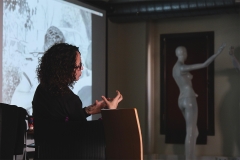
"Working with Found Footage" Workshop Organized with Zeyno Pekünlü
Artist, director, activist and academician Zeyno Pekünlü was the guest of CDM232: Digital Film Studio II.
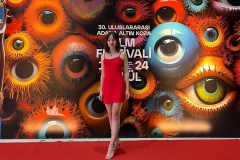
CDM senior year student Ecem has been selected to the Animation category at Adana Altın Koza Film Festival
CDM 4th-grade student Ecem Çörtle has been selected as a finalist in the National Student Films category of the 30th International Adana
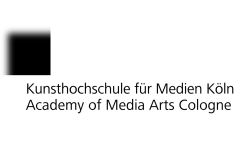
CDM graduate Eylül Berivan Kızılırmak has been accepted to the Cologne Academy of Media Arts
CDM graduate Eylül Berivan Kızılırmak has been accepted to the master's program at the Academy of Media Arts Cologne (Kunsthochschule für Medien Köln).
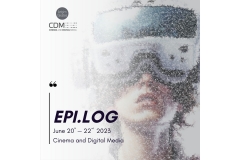
Traditionalistic CDM End of Year Exhibition EPI.LOG took place in FC Studios
Cinema and Digital Media End of Year Exhibition EPI.LOG 2023, organized as part of IUE Faculty of Communication Exhibition "FC-EX 2023", was
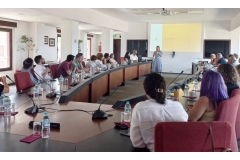
IUE Faculty of Communication Advisory Board members visited our Faculty and Studios on June 22, 2023
IUE Faculty of Communication Advisory Board members Andreas Treske, Ayşe Matay, Barbaros Görgü, Dilek Gappi, Elif Demirci İşleğen, Emine Uysal Berger, Murat
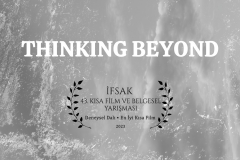
Ataberk awarded at the İFSAK 43rd National Short Film and Documentary Competition
Our third-year student, Ataberk Eyolcu, returned from the 43rd National Short Film and Documentary Competition of İFSAK (Istanbul Photography and Cinema Amateurs
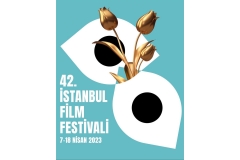
Our third-year CDM student Fikret Başar Kaya was at the 42nd Istanbul Film Festival
Our third year CDM student Fikret Başar Kaya participated as a Young Jury at the 42nd Istanbul Film Festival held on April
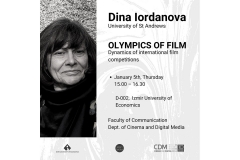
CDM hosted Dina Iordanova
Prof. Dina Iordanova gave a speech titled Olympics of Film: Dynamics of international film competitions on Thursday, January 5, 2023, in D002 at Izmir

